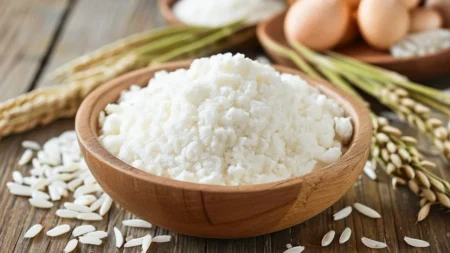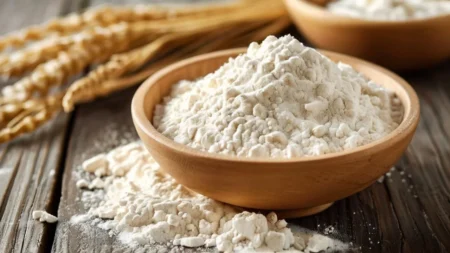Pineapples: A Tropical Superfood Packed with Nutrients and Health Benefits
Key Takeaways:
- Pineapples are rich in vitamins, minerals, and the enzyme bromelain, which has anti-inflammatory properties.
- They support digestion, boost immunity, and promote skin health.
- Pineapples are versatile and can be consumed fresh, cooked, juiced, or blended into smoothies.

Nutritional Profile of Pineapples
Pineapples are not just refreshing and delicious, but they are also loaded with essential nutrients. Here’s a breakdown of the nutrients found in one cup (165 grams) of fresh pineapple chunks:
| Nutrient | Amount |
|---|---|
| Calories | 82 kcal |
| Carbohydrates | 21.7 grams |
| Sugars | 16.3 grams |
| Protein | 0.9 grams |
| Fat | 0.2 grams |
| Dietary Fiber | 2.3 grams (9% DV) |
| Vitamin C | 79 mg (88% DV) |
| Manganese | 1.5 mg (76% DV) |
| Vitamin B6 | 0.2 mg (11% DV) |
High in Vitamin C
Pineapples are a great source of vitamin C, which is essential for maintaining a strong immune system, collagen production, and fighting free radicals in the body.
Rich in Manganese
Manganese is a mineral crucial for bone health and metabolic processes. Pineapples are particularly rich in manganese, contributing significantly to your daily needs.
Health Benefits of Pineapples
1. Aids Digestion
Pineapples contain bromelain, a digestive enzyme that helps break down proteins and promote efficient digestion. This enzyme may also relieve symptoms of bloating, indigestion, and constipation.
2. Supports Immunity
Thanks to their high vitamin C content, pineapples boost the immune system by helping the body fight infections and maintain healthy tissues. Vitamin C is also a powerful antioxidant, neutralizing free radicals that can lead to inflammation.
3. Promotes Healthy Skin
The abundance of vitamin C in pineapples aids in the production of collagen, a protein that keeps your skin firm and elastic. Regular consumption of pineapples can lead to healthier, more vibrant skin by reducing wrinkles and improving overall skin texture.
4. Anti-Inflammatory Properties
Bromelain, the enzyme found in pineapples, has anti-inflammatory effects that can help reduce swelling, pain, and inflammation, particularly in the context of injuries or surgeries. Some studies suggest that bromelain may also help relieve symptoms of arthritis.
Types of Pineapples
There are several types of pineapples, each with its own distinct flavor and characteristics. Here are some common varieties:
| Type | Description |
|---|---|
| Smooth Cayenne | The most common variety, juicy with a sweet-tart flavor. |
| Red Spanish | Known for its fibrous flesh and mildly sweet taste. |
| Queen | Small, aromatic, and very sweet. |
| Sugarloaf | Exceptionally sweet and low in acidity. |
Smooth Cayenne
Smooth Cayenne is the most widely grown and recognized variety of pineapple. It has a perfect balance of sweetness and acidity, making it ideal for both eating fresh and using in recipes.
Red Spanish
Red Spanish pineapples have a more fibrous texture and a slightly less sweet flavor compared to Smooth Cayenne. They are often used in canning and processing.
How to Incorporate Pineapples into Your Diet
Pineapples are incredibly versatile and can be used in a wide variety of dishes, both sweet and savory. Here are some ideas for incorporating more pineapple into your meals:
1. Fresh Pineapple as a Snack
Simply enjoy freshly cut pineapple chunks as a refreshing snack. The natural sweetness makes it a healthy alternative to sugary snacks.
2. Pineapple in Smoothies
Pineapple adds a tropical flavor and natural sweetness to smoothies. Combine it with spinach, bananas, and coconut water for a nutrient-packed green smoothie.
3. Grilled Pineapple
Grilling pineapple caramelizes its natural sugars and enhances its sweetness. Serve grilled pineapple slices as a dessert or pair them with grilled meats for a delicious contrast of flavors.
Pineapple for Weight Loss
Pineapples can be a valuable addition to a weight loss diet. They are low in calories but high in water and fiber, which can promote satiety and help reduce overall calorie intake. Additionally, the bromelain in pineapples may support fat digestion, making it easier for the body to metabolize fat.
Cooking with Pineapples
Pineapples are incredibly versatile in the kitchen and can be used in everything from breakfast dishes to dinner and desserts. Here are some ways to cook with pineapples:
| Dish | How to Use Pineapples |
|---|---|
| Tropical Salads | Add fresh pineapple chunks to salads for sweetness. |
| Pizza Topping | Use pineapple as a topping for Hawaiian pizza. |
| Salsa | Make a pineapple salsa with jalapeños and cilantro. |
| Desserts | Use pineapple in tarts, upside-down cakes, or sorbets. |
Pineapple Salsa
Combine diced pineapple with red onion, cilantro, jalapeños, and lime juice for a sweet and spicy salsa. This pairs beautifully with grilled chicken, fish, or tortilla chips.
Pineapple in Salads
Fresh pineapple chunks can be added to fruit or green salads. Its sweetness balances out the tartness of vinaigrettes or the saltiness of cheeses, making for a well-rounded dish.
Conclusion
Pineapples are more than just a tropical treat—they are a nutrient-dense fruit with a variety of health benefits. Rich in vitamin C, bromelain, and antioxidants, pineapples support digestion, boost the immune system, and improve skin health. Whether eaten fresh, grilled, or blended into smoothies, pineapples are a delicious and versatile addition to any diet.
FAQ
Q: How do I choose a ripe pineapple?
A: A ripe pineapple should have a sweet aroma at the base and yield slightly when pressed. The skin should be golden-yellow in color, and the leaves should be vibrant and green.
Q: Is it safe to eat pineapple if I have acid reflux?
A: Pineapples are acidic, so they may trigger symptoms in individuals with acid reflux. If you’re sensitive to acidic foods, it’s best to consume them in moderation.
Q: Can I use pineapple to tenderize meat?
A: Yes, the bromelain in pineapple can break down proteins and act as a natural meat tenderizer. Marinate meats with pineapple for a few hours before cooking to enhance texture.
Q: How should I store fresh pineapple?
A: Uncut pineapples should be stored at room temperature until ripe. Once cut, refrigerate pineapple in an airtight container to maintain freshness for up to 5 days










